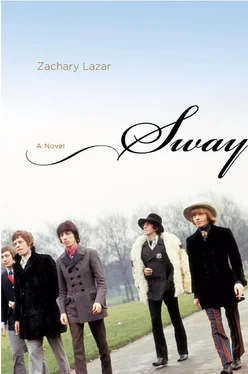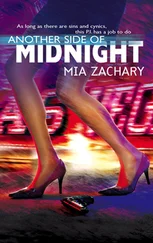Afterward, Anger tracked him down in the parking lot, where he and his girlfriend were loading equipment into a van. He was a filmmaker, he said, he was making a film, would the boy have any interest in playing a part in his next film?
His girlfriend put her fingers on Bobby’s cheek and whispered something into his ear. He turned to her and whispered something back. Then the girl looked at Anger with a furtive smile, a smile that echoed and expanded and gleamed.
He was eighteen, Bobby told Anger that afternoon. Most people thought he was older because he’d been living on his own for the past year and a half, first in L.A, then in San Francisco. His parents in Santa Barbara had kicked him out, because he was out of their control. He would disappear for a couple of days, sometimes more, not even realizing it, just forgetting to call home, forgetting why it mattered. It was his dreaminess that his father never understood. It was what they fought about day after day, for as long as he could remember.
When he was sixteen, they’d sent him to a reform school north of Sacramento, where he’d lived in a barracks with thirty other boys, digging ditches, moving rocks, cleaning bathrooms, loading sacks of potatoes onto flatbed trucks and then riding with the trucks to the grader to unload them. For a year, he’d worn the same uniform as everyone else. Like everyone else’s, his hair had been shorn with an electric clipper, so that the curve of his skull shone like a knob beneath the taut gray skin. Eventually he lost his real name and was called by a nickname chosen by the others, a way of being told all over again that he would be perceived in a way that had nothing to do with who he was. There were fights almost every day — fights behind the mess hall, fights in the showers, fights with bare fists or with plungers or with brooms or with knives from the kitchen. He learned to fight with a joyless focus that made his opponents lose interest, until eventually his friendship became coveted and he didn’t have to fight at all anymore.
When he got out of reform school, he was seventeen. He lived with his parents for an abortive month, then he lived for a while in a trailer with a thirty-six-year-old woman. In the meantime, he’d started playing with a rock band in L.A., a band who had a recording contract now — who were on their way to becoming famous — but who had told Bobby he was too young, too pretty-looking, that they were serious musicians and he had to leave.
Anger couldn’t stop looking at him that afternoon. He could feel the faint tension as Bobby paced the room, wondering perhaps if Anger was even listening. At times, it was like looking at a beautiful girl, a diffuse desire that he wasn’t quite sure what to do with. At other times, the desire was so blatant that he could feel his face burn.
“There’s this thing about women,” Bobby told him. “You get to a point with them where they can’t say no without hurting themselves, some idea they have about themselves. I used to go to nightclubs in this very straight outfit, suit and tie, my hair all combed and watered. I would have a Coke or a ginger ale. It was like, ‘Oh, I’m just this lost little boy. So shy I can barely talk to you. Maybe you could take me home.’ ”
“A good act,” said Anger.
“But it wasn’t an act. I never thought it was an act. If I did, I never would have been able to do it.”
He was making a film about Lucifer, yes, but it was not the devil he was talking about, not the pitchfork and the horns, not the spooky thing from the movies. Lucifer was a god of light, a child god, the fallen angel who after two thousand years of repression was finally coming back. He was the god of desire, illicit desire, the liberator, the revelator. How could he explain it to someone like Bobby, whom Anger could not look at without seeing the angel’s wholly unknowing embodiment? He’d said that it was just a way of naming or looking at things that were happening in the world right now, a kind of mythology he liked to play around with sometimes, a way of describing how the world was changing, opening it up to deeper meanings. Yes, he’d told Bobby, Lucifer was the role he would play in the film, but it wasn’t worth thinking about very much. All he would really be doing was just playing himself. At first, it would just be a matter of watching him, watching him and seeing what happened.
They started by making little films around town: at Golden Gate Park, in front of the Diggers’ “free store” on Frederick Street. One day they went for a drive north of the city toward Bolinas, the camera and the equipment in the back of the station wagon, Bobby at the wheel, Anger in the passenger seat. Through the windows, the hills were a pale brown, like wheat, and the ocean, when they glimpsed it, was gray beneath the fog.
“I’m going down to L.A. for a while,” Bobby said.
Anger looked down at his hands on his legs.
“We have to get something going,” Bobby said. “The band. All the record companies are down there.” The road flattened and rose into a gradual incline, and he gripped the lever on the steering column, forcing it into lower gear.
“I thought we were making a film,” said Anger.
“Well, there’s that too. That’s obviously a priority. But the band is about to go somewhere. I can feel that.”
Anger nodded slowly. At the end of the hill, on their left, they saw the beginnings of the event they were about to attend. Beyond a row of picnic tables and a pair of outhouses, someone had erected a kind of pavilion made of different-colored bedsheets. Around it were people in costume — a boy with a flute and a leather vest, a boy in a painted cape and a wizard’s hat. It was a style that mostly eluded Anger, an irreverent humor that never settled on innocence or sarcasm but wavered between them. Bobby was already smiling in the strange, coded way that Anger had learned to recognize, the smile of people who were younger than he was.
“How long will you be gone?” he asked.
“I don’t know. Maybe a few months? It’s up in the air.”
“A few months.”
“Like I said, it’s not set in stone. We’re going to be lining things up once we get there. Showcases and things.”
“It sounds like maybe it’s not set at all.”
Bobby stared straight ahead through the windshield. “We won’t know until we get there,” he said. “That’s all I know for now. I told you from the very beginning that the band was what I was about. I would think that you of all people would understand that.”
Anger immersed himself in work, just like his father, who had spent all his spare time in his garage, fixated on his machines. After Bobby left, he did an elaborate reediting of a film he now saw could be called “psychedelic,” a film called Inauguration of the Pleasure Dome . He added superimpositions, doubling and tripling the images so that the action seemed to take place in a vast, floating darkness. He synced each cut to the music, jumbling the separate tableaux until they began to build a rhythm, finessing tension and drama out of nothing but images. Outside it was June. The streets were lined with sycamores whose leaves were yellow-green and full of the strange, quasi-tropical succulence that reminded him of the trees of his childhood in Santa Monica. He stayed inside the editing room; he tried not to think about why he was there. The work was time-consuming, and for ten or twelve hours he would lose himself in its intricacies.
It was fine, until a package arrived, three days after Bobby left. It was an overstuffed manila envelope containing a motorcycle T-shirt and an anonymous note, a quotation from The Sephiroth: “Look into the sightless Eye of the Moon and see what Light glows there. There is no Life without Death. You have been sleepwalking. Now go back to bed and dream of the Sun.”
Читать дальше












